Django项目:CMDB(服务器硬件资产自动采集系统)--03--03CMDB信息安全API接口交互认证
Posted 颜言
tags:
篇首语:本文由小常识网(cha138.com)小编为大家整理,主要介绍了Django项目:CMDB(服务器硬件资产自动采集系统)--03--03CMDB信息安全API接口交互认证相关的知识,希望对你有一定的参考价值。


1 #settings.py 2 """ 3 Django settings for AutoCmdb project. 4 5 Generated by \'django-admin startproject\' using Django 2.0.6. 6 7 For more information on this file, see 8 https://docs.djangoproject.com/en/2.0/topics/settings/ 9 10 For the full list of settings and their values, see 11 https://docs.djangoproject.com/en/2.0/ref/settings/ 12 """ 13 14 import os 15 16 # Build paths inside the project like this: os.path.join(BASE_DIR, ...) 17 BASE_DIR = os.path.dirname(os.path.dirname(os.path.abspath(__file__))) 18 19 20 # Quick-start development settings - unsuitable for production 21 # See https://docs.djangoproject.com/en/2.0/howto/deployment/checklist/ 22 23 # SECURITY WARNING: keep the secret key used in production secret! 24 SECRET_KEY = \'35d18e6vmo0k*xg#h=&kuer*t3a#@hv09@@kvz@=dd@dzw&!7w\' 25 26 # SECURITY WARNING: don\'t run with debug turned on in production! 27 DEBUG = True 28 29 ALLOWED_HOSTS = [] 30 31 32 # Application definition 33 34 INSTALLED_APPS = [ 35 \'django.contrib.admin\', 36 \'django.contrib.auth\', 37 \'django.contrib.contenttypes\', 38 \'django.contrib.sessions\', 39 \'django.contrib.messages\', 40 \'django.contrib.staticfiles\', 41 \'api.apps.ApiConfig\', 42 ] 43 44 MIDDLEWARE = [ 45 \'django.middleware.security.SecurityMiddleware\', 46 \'django.contrib.sessions.middleware.SessionMiddleware\', 47 \'django.middleware.common.CommonMiddleware\', 48 \'django.middleware.csrf.CsrfViewMiddleware\', 49 \'django.contrib.auth.middleware.AuthenticationMiddleware\', 50 \'django.contrib.messages.middleware.MessageMiddleware\', 51 \'django.middleware.clickjacking.XFrameOptionsMiddleware\', 52 ] 53 54 ROOT_URLCONF = \'AutoCmdb.urls\' 55 56 TEMPLATES = [ 57 { 58 \'BACKEND\': \'django.template.backends.django.DjangoTemplates\', 59 \'DIRS\': [], 60 \'APP_DIRS\': True, 61 \'OPTIONS\': { 62 \'context_processors\': [ 63 \'django.template.context_processors.debug\', 64 \'django.template.context_processors.request\', 65 \'django.contrib.auth.context_processors.auth\', 66 \'django.contrib.messages.context_processors.messages\', 67 ], 68 }, 69 }, 70 ] 71 72 WSGI_APPLICATION = \'AutoCmdb.wsgi.application\' 73 74 75 # Database 76 # https://docs.djangoproject.com/en/2.0/ref/settings/#databases 77 78 DATABASES = { 79 \'default\': { 80 \'ENGINE\': \'django.db.backends.sqlite3\', 81 \'NAME\': os.path.join(BASE_DIR, \'db.sqlite3\'), 82 } 83 } 84 85 86 # Password validation 87 # https://docs.djangoproject.com/en/2.0/ref/settings/#auth-password-validators 88 89 AUTH_PASSWORD_VALIDATORS = [ 90 { 91 \'NAME\': \'django.contrib.auth.password_validation.UserAttributeSimilarityValidator\', 92 }, 93 { 94 \'NAME\': \'django.contrib.auth.password_validation.MinimumLengthValidator\', 95 }, 96 { 97 \'NAME\': \'django.contrib.auth.password_validation.CommonPasswordValidator\', 98 }, 99 { 100 \'NAME\': \'django.contrib.auth.password_validation.NumericPasswordValidator\', 101 }, 102 ] 103 104 105 # Internationalization 106 # https://docs.djangoproject.com/en/2.0/topics/i18n/ 107 108 LANGUAGE_CODE = \'en-us\' 109 110 TIME_ZONE = \'UTC\' 111 112 USE_I18N = True 113 114 USE_L10N = True 115 116 USE_TZ = True 117 118 119 # Static files (CSS, javascript, Images) 120 # https://docs.djangoproject.com/en/2.0/howto/static-files/ 121 122 STATIC_URL = \'/static/\' 123 124 TEMPLATE_DIRS = (os.path.join(BASE_DIR, \'templates\'),) 125 126 # ————————03CMDB信息安全API接口交互认证———————— 127 ASSET_AUTH_KEY = \'299095cc-1330-11e5-b06a-a45e60bec08b\' #认证的密码 128 ASSET_AUTH_TIME = 2 #认证的有效时间 #2秒 129 # ————————03CMDB信息安全API接口交互认证————————
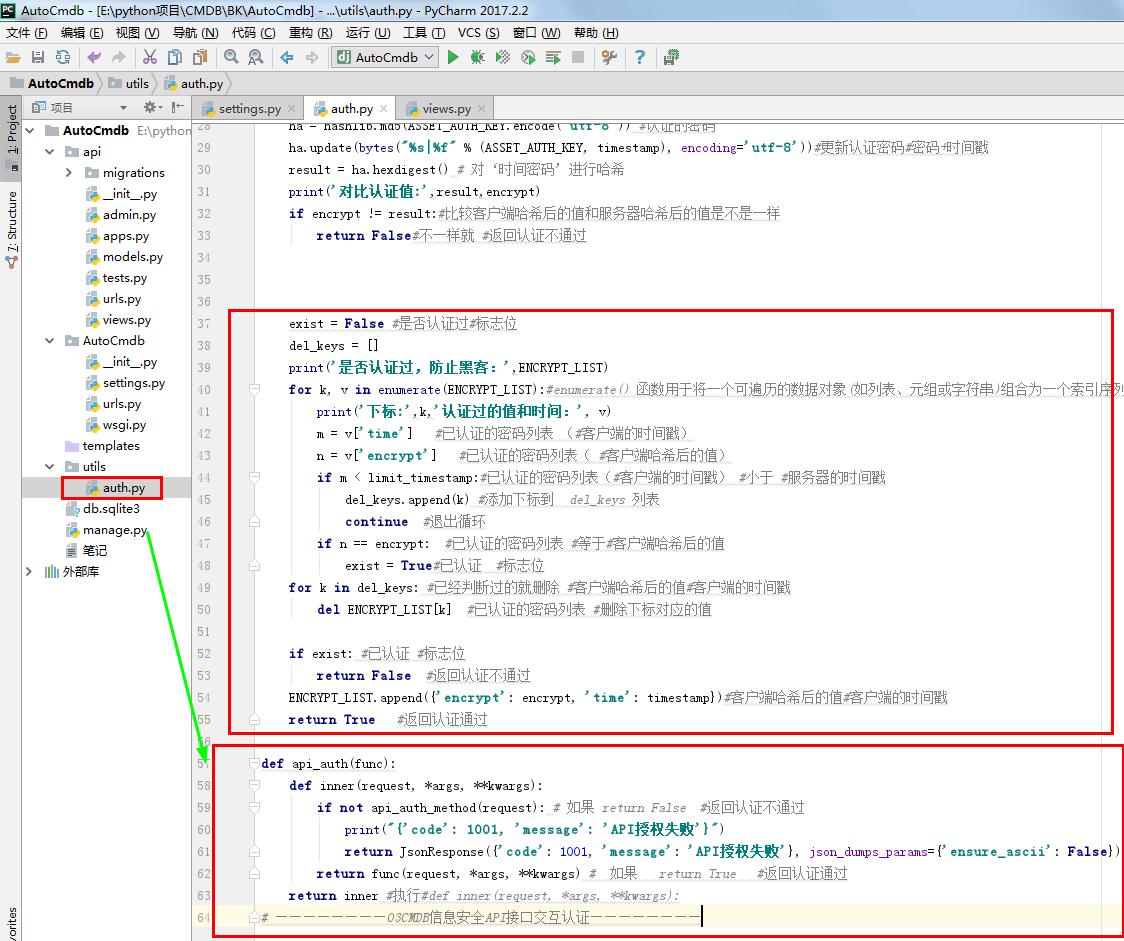
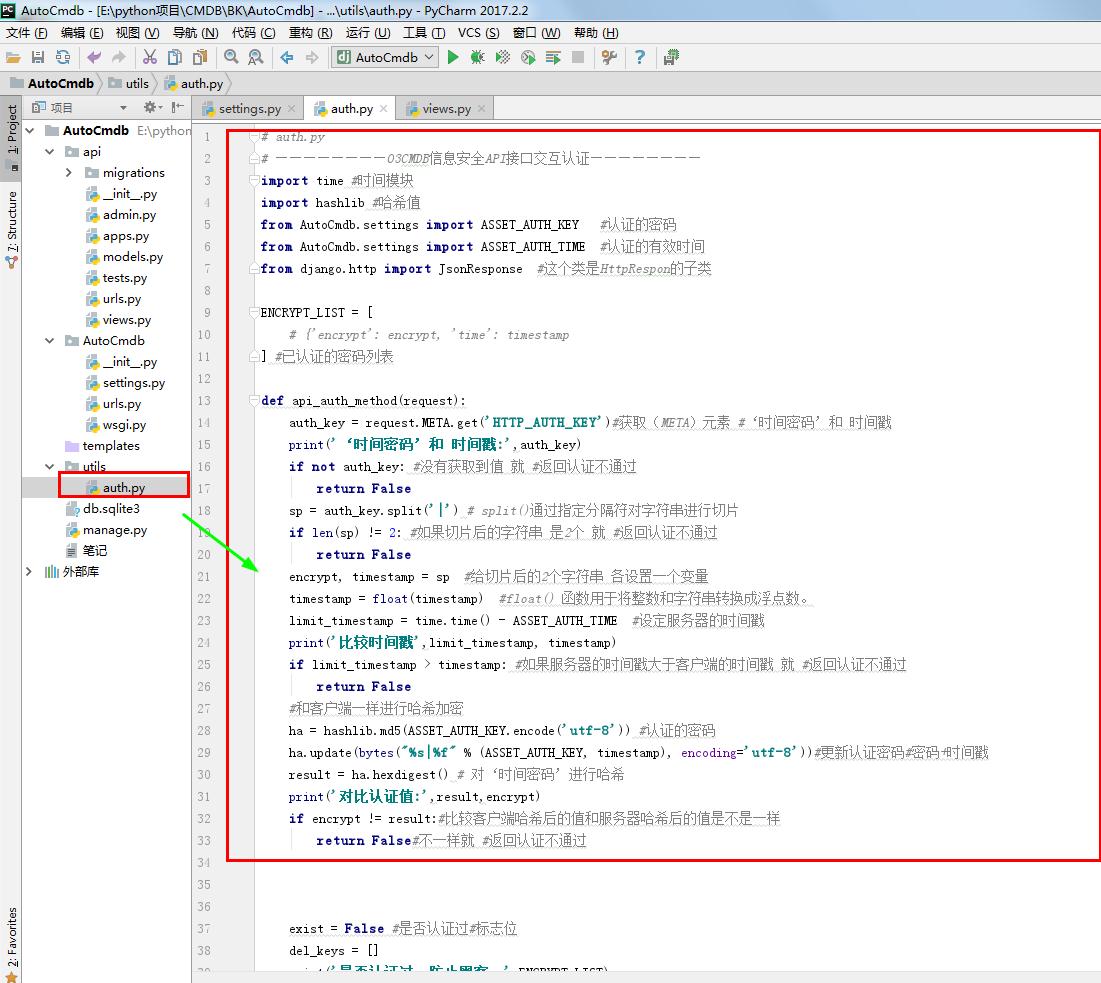

1 # auth.py 2 # ————————03CMDB信息安全API接口交互认证———————— 3 import time #时间模块 4 import hashlib #哈希值 5 from AutoCmdb.settings import ASSET_AUTH_KEY #认证的密码 6 from AutoCmdb.settings import ASSET_AUTH_TIME #认证的有效时间 7 from django.http import JsonResponse #这个类是HttpRespon的子类 8 9 ENCRYPT_LIST = [ 10 # {\'encrypt\': encrypt, \'time\': timestamp 11 ] #已认证的密码列表 12 13 def api_auth_method(request): 14 auth_key = request.META.get(\'HTTP_AUTH_KEY\')#获取(META)元素 #‘时间密码’和 时间戳 15 print(\'‘时间密码’和 时间戳:\',auth_key) 16 if not auth_key: #没有获取到值 就 #返回认证不通过 17 return False 18 sp = auth_key.split(\'|\') # split()通过指定分隔符对字符串进行切片 19 if len(sp) != 2: #如果切片后的字符串 是2个 就 #返回认证不通过 20 return False 21 encrypt, timestamp = sp #给切片后的2个字符串 各设置一个变量 22 timestamp = float(timestamp) #float() 函数用于将整数和字符串转换成浮点数。 23 limit_timestamp = time.time() - ASSET_AUTH_TIME #设定服务器的时间戳 24 print(\'比较时间戳\',limit_timestamp, timestamp) 25 if limit_timestamp > timestamp: #如果服务器的时间戳大于客户端的时间戳 就 #返回认证不通过 26 return False 27 #和客户端一样进行哈希加密 28 ha = hashlib.md5(ASSET_AUTH_KEY.encode(\'utf-8\')) #认证的密码 29 ha.update(bytes("%s|%f" % (ASSET_AUTH_KEY, timestamp), encoding=\'utf-8\'))#更新认证密码#密码+时间戳 30 result = ha.hexdigest() # 对‘时间密码’进行哈希 31 print(\'对比认证值:\',result,encrypt) 32 if encrypt != result:#比较客户端哈希后的值和服务器哈希后的值是不是一样 33 return False#不一样就 #返回认证不通过 34 exist = False #是否认证过#标志位 35 del_keys = [] 36 print(\'是否认证过,防止黑客:\',ENCRYPT_LIST) 37 for k, v in enumerate(ENCRYPT_LIST):#enumerate() 函数用于将一个可遍历的数据对象(如列表、元组或字符串)组合为一个索引序列,同时列出数据和数据下标,一般用在 for 循环当中。 38 print(\'下标:\',k,\'认证过的值和时间:\', v) 39 m = v[\'time\'] #已认证的密码列表 (#客户端的时间戳) 40 n = v[\'encrypt\'] #已认证的密码列表( #客户端哈希后的值) 41 if m < limit_timestamp:#已认证的密码列表(#客户端的时间戳) #小于 #服务器的时间戳 42 del_keys.append(k) #添加下标到 del_keys 列表 43 continue #退出循环 44 if n == encrypt: #已认证的密码列表 #等于#客户端哈希后的值 45 exist = True#已认证 #标志位 46 for k in del_keys: #已经判断过的就删除 #客户端哈希后的值#客户端的时间戳 47 del ENCRYPT_LIST[k] #已认证的密码列表 #删除下标对应的值 48 if exist: #已认证 #标志位 49 return False #返回认证不通过 50 ENCRYPT_LIST.append({\'encrypt\': encrypt, \'time\': timestamp})#客户端哈希后的值#客户端的时间戳 51 return True #返回认证通过 52 53 def api_auth(func): 54 def inner(request, *args, **kwargs): 55 if not api_auth_method(request): # 如果 return False #返回认证不通过 56 print("{\'code\': 1001, \'message\': \'API授权失败\'}") 57 return JsonResponse({\'code\': 1001, \'message\': \'API授权失败\'}, json_dumps_params={\'ensure_ascii\': False}) 58 return func(request, *args, **kwargs) # 如果 return True #返回认证通过 59 return inner #执行#def inner(request, *args, **kwargs): 60 # ————————03CMDB信息安全API接口交互认证————————
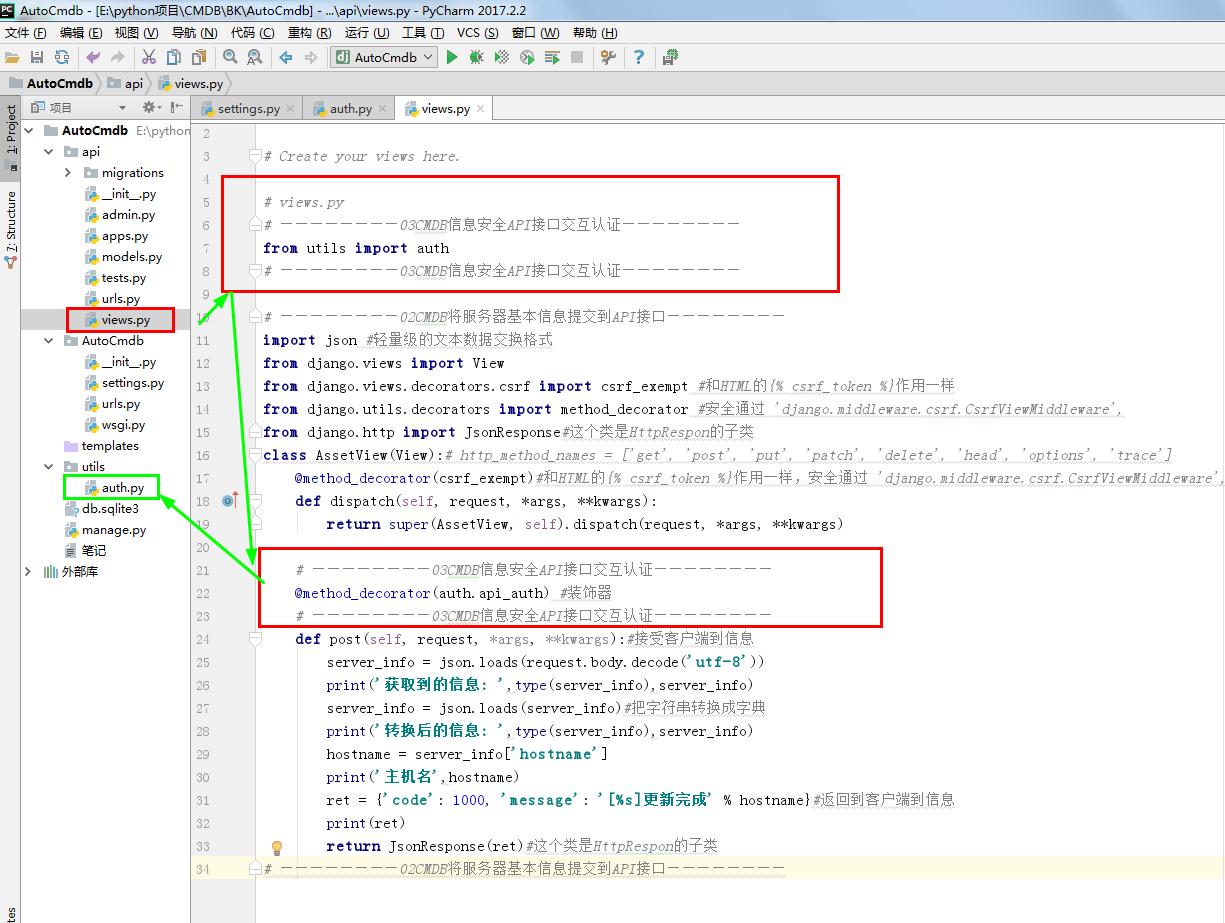

1 from django.shortcuts import render 2 3 # Create your views here. 4 5 # views.py 6 # ————————03CMDB信息安全API接口交互认证———————— 7 from utils import auth 8 # ————————03CMDB信息安全API接口交互认证———————— 9 10 # ————————02CMDB将服务器基本信息提交到API接口———————— 11 import json #轻量级的文本数据交换格式 12 from django.views import View 13 from django.views.decorators.csrf import csrf_exempt #和html的{% csrf_token %}作用一样 14 from django.utils.decorators import method_decorator #安全通过 \'django.middleware.csrf.CsrfViewMiddleware\', 15 from django.http import JsonResponse#这个类是HttpRespon的子类 16 class AssetView(View):# http_method_names = [\'get\', \'post\', \'put\', \'patch\', \'delete\', \'head\', \'options\', \'trace\'] 17 @method_decorator(csrf_exempt)#和HTML的{% csrf_token %}作用一样,安全通过 \'django.middleware.csrf.CsrfViewMiddleware\', 18 def dispatch(self, request, *args, **kwargs): 19 return super(AssetView, self).dispatch(request, *args, **kwargs) 20 21 # ————————03CMDB信息安全API接口交互认证———————— 22 @method_decorator(auth.api_auth) #装饰器 23 # ————————03CMDB信息安全API接口交互认证———————— 24 def post(self, request, *args, **kwargs):#接受客户端到信息 25 server_info = json.loads(request.body.decode(\'utf-8\')) 26 print(\'获取到的信息: \',type(server_info),server_info) 27 server_info = json.loads(server_info)#把字符串转换成字典 28 print(\'转换后的信息: \',type(server_info),server_info) 29 hostname = server_info[\'hostname\'] 30 print(\'主机名\',hostname) 31 ret = {\'code\': 1000, \'message\': \'[%s]更新完成\' % hostname}#返回到客户端到信息 32 print(ret) 33 return JsonResponse(ret)#这个类是HttpRespon的子类 34 # ————————02CMDB将服务器基本信息提交到API接口————————
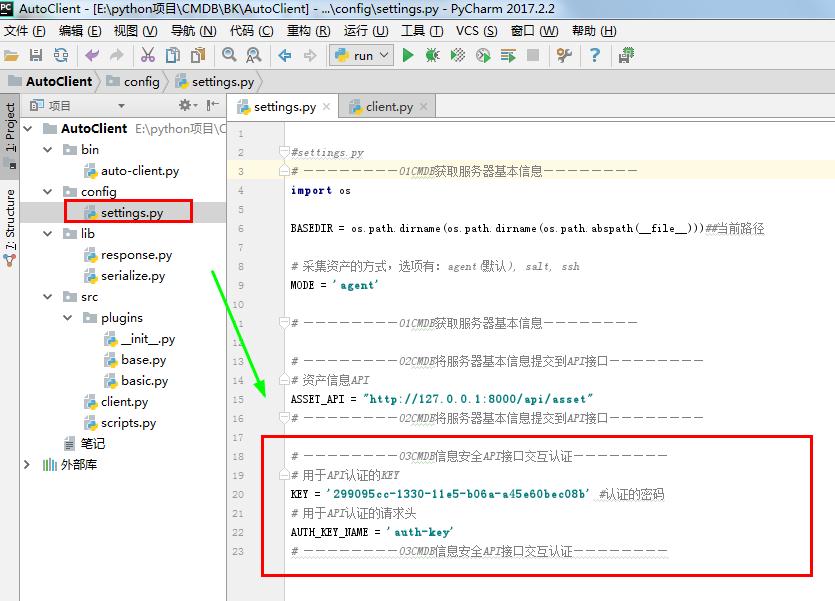

1 #settings.py 2 # ————————01CMDB获取服务器基本信息———————— 3 import os 4 5 BASEDIR = os.path.dirname(os.path.dirname(os.path.abspath(__file__)))##当前路径 6 7 # 采集资产的方式,选项有:agent(默认), salt, ssh 8 MODE = \'agent\' 9 10 # ————————01CMDB获取服务器基本信息———————— 11 12 # ————————02CMDB将服务器基本信息提交到API接口———————— 13 # 资产信息API 14 ASSET_API = "http://127.0.0.1:8000/api/asset" 15 # ————————02CMDB将服务器基本信息提交到API接口———————— 16 17 # ————————03CMDB信息安全API接口交互认证———————— 18 # 用于API认证的KEY 19 KEY = \'299095cc-1330-11e5-b06a-a45e60bec08b\' #认证的密码 20 # 用于API认证的请求头 21 AUTH_KEY_NAME = \'auth-key\' 22 # ————————03CMDB信息安全API接口交互认证————————
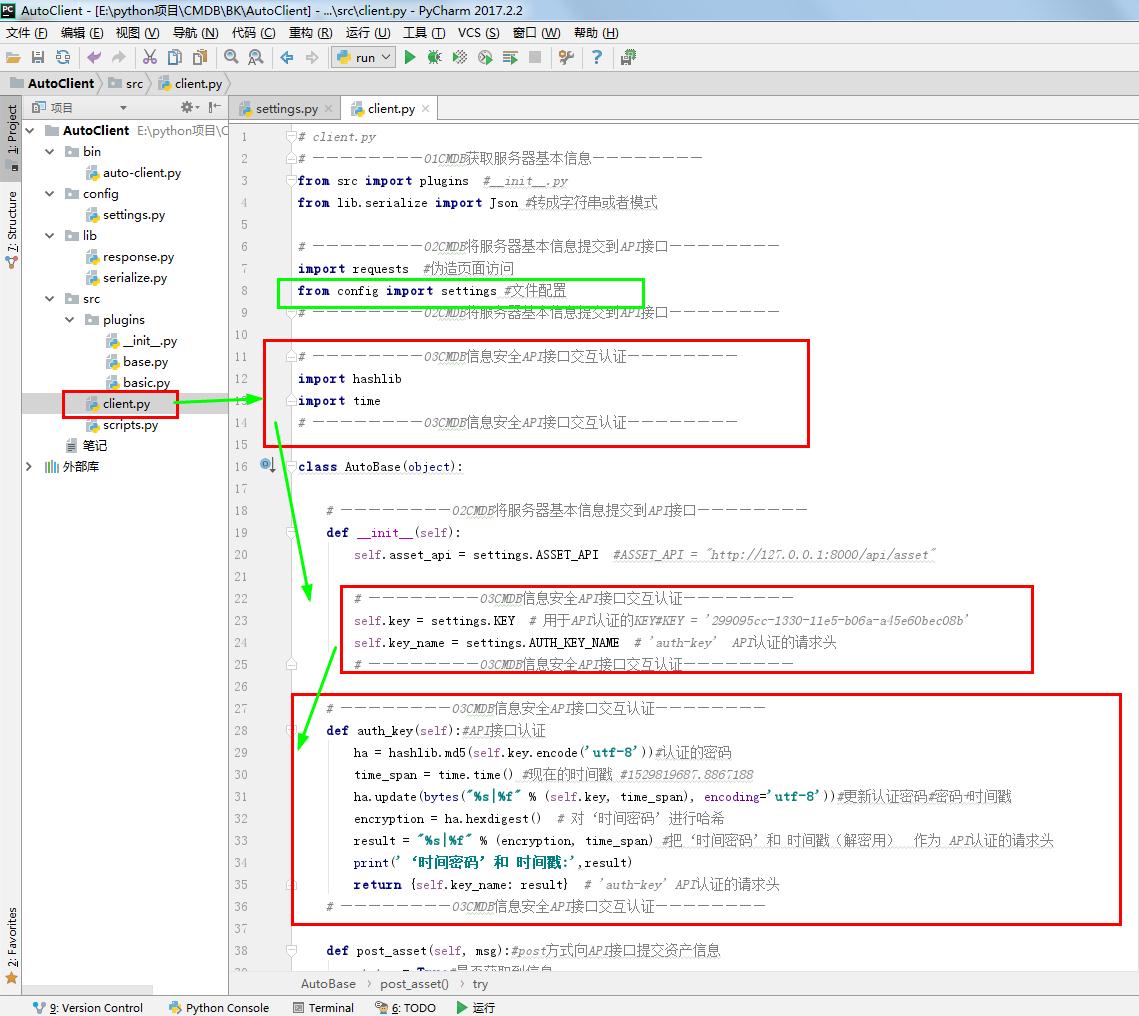
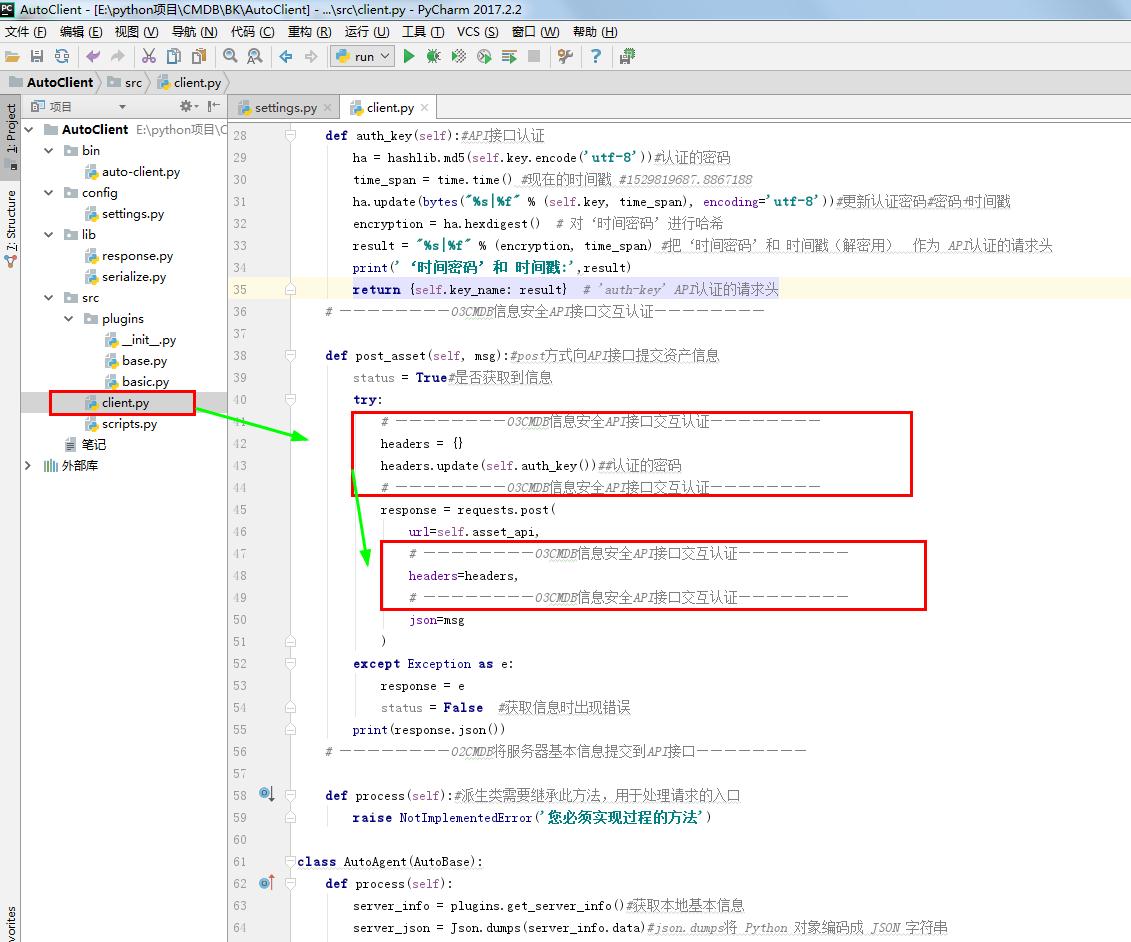

1 # client.py 2 # ————————01CMDB获取服务器基本信息———————— 3 from src import plugins #__init__.py 4 from lib.serialize import Json #转成字符串或者模式 5 6 # ————————02CMDB将服务器基本信息提交到API接口———————— 7 import requests #伪造页面访问 8 from config import settings #文件配置 9 # ————————02CMDB将服务器基本信息提交到API接口———————— 10 11 # ————————03CMDB信息安全API接口交互认证———————— 12 import hashlib 13 import time 14 # ————————03CMDB信息安全API接口交互认证———————— 15 16 class AutoBase(object): 17 18 # ————————02CMDB将服务器基本信息提交到API接口———————— 19 def __init__(self): 20 self.asset_api = settings.ASSET_API #ASSET_API = "http://127.0.0.1:8000/api/asset" 21 22 # ————————03CMDB信息安全API接口交互认证———————— 23 self.key = settings.KEY # 用于API认证的KEY#KEY = \'299095cc-1330-11e5-b06a-a45e60bec08b\' 24 self.key_name = settings.AUTH_KEY_NAME # \'auth-key\' API认证的请求头 25 # ————————03CMDB信息安全API接口交互认证———————— 26 27 # ————————03CMDB信息安全API接口交互认证———————— 28 def auth_key(self):#API接口认证 29 ha = hashlib.md5(self.key.encode(\'utf-8\'))#认证的密码 30 time_span = time.time() #现在的时间戳 #1529819687.8867188 31 ha.update(bytes("%s|%f" % (self.key, time_span), encoding=\'utf-8\'))#更新认证密码#密码+时间戳 32 encryption = ha.hexdigest() # 对‘时间密码’进行哈希 33 result = "%s|%f" % (encryption, time_span) #把‘时间密码’和 时间戳(解密用) 作为 API认证的请求头 34 print(\'‘时间密码’和 时间戳:\',result) 35 return {self.key_name: result} # \'auth-key\' API认证的请求头 36 # ————————03CMDB信息安全API接口交互认证———————— 37 38 def post_asset(self, msg):#post方式向API接口提交资产信息 39 status = True#是否获取到信息 40 try: 41 # ————————03CMDB信息安全API接口交互认证———————— 42 headers = {} 43 headers.update(self.auth_key())##认证的密码 44 # ————————03CMDB信息安全API接口交互认证———————— 45 response = requests.post( 46 url=self.asset_api, 47 # ————————03CMDB信息安全API接口交互认证———————— 48 headers=headers, 49 # ————————03CMDB信息安全API接口交互认证———————— 50 json=msg 51 ) 52 except Exception as e: 53 response = e 54 status = False #获取信息时出现错误 55 print(response.json()) 56 # ————————以上是关于Django项目:CMDB(服务器硬件资产自动采集系统)--03--03CMDB信息安全API接口交互认证的主要内容,如果未能解决你的问题,请参考以下文章
